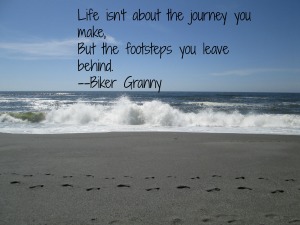
When I wrote those words in the novel Run or Die, they came from growing up with my mother. She was a woman who became the first female remodeling contractor in our state to do her own work. Never play the damsel-in-distress because if you play it long enough, you become it. Never back down from a bully; they only get worse. And, whenever you get knocked down, pick yourself back up and throw yourself back into the fight. Never settle; constantly strive to improve, to grow, to become more.
All very necessary lessons as I grew up in a ghetto. A poverty-stricken area where dreams died fast and so did most people. But most people weren’t my mother.
Flying saucers were part of my childhood–they were the things my mom threw at my stepfather. She liked knives, too, but unlike the cups and saucers, she deliberately missed with the knives. A friendly warning; that’s all. Her temper was well-known in our neighborhood. No one wanted to set it off, including me. All too frequently, I was at the wrong end of her temper; often for reasons I never understood.
You’d think that with memories like that, that I would despise my mother. Honestly, I did go through a phase of hating her, but it never diminished the fact that I also loved and admired her; respected and idolized her. Why? One time she told me to wake her up and when I did, she threw a Vick’s jar at me. I ducked and took off out of the house until she calmed down. So, why do I retain good memories of my mother? Why do I speak of her with respect?
Because, in spite of the violence, my mother was a kind and caring person. No, that is not some illusion succored by someone who can’t accept the truth; the reality. Let me tell you about the woman beneath the violence.
My mother grew up in a coal camp–tarpaper shanties where coal miners and their families lived while the miners eked out a piss poor existence. Water hauled from the creek, kerosene lanterns rather than electricity, outdoor latrines. A tough life. My grandmother cleaned a rich woman’s house for a pittance and the rich woman’s castoff clothes that Grandma altered by lantern light. My mother’s father–my biological grandfather–like most men in the camps believed it was his right to get drunk on money needed for food and to come home and beat his wife and children.
My grandmother, like most women of that day and that place, put up with the beatings until the night he staggered home and went after my mother. My grandmother grabbed his gun from the cupboard. She told him to “Get yerself right with your Maker, John.” Then she pulled the trigger. Fortunately, or unfortunately, (I never could decide on that) John took those seconds to dive out of the tarpaper-covered window hole. Grandma plugged him in the upper thigh, but he’d learned his lesson. He didn’t return and died in a coal mine cave-in years later.
Didn’t matter. He had used his money for booze and women. It was Grandma’s work that fed and housed the family.
Fast forward to when my mother turned fourteen. She had a beautiful singing voice and from somewhere managed to scrounge up a battered guitar and taught herself how to play. Big dreams for a girl in a coal mining camp. Eventually, she ran away to the city where singers, even women, could find jobs as singers and guitar pickers. Yes, some women did find lounges and places to launch their career as singers. My mother wasn’t so lucky. She scratched out a living doing whatever it took to survive.
But, she never gave up. She wrote songs and found small venues where they hired her to play and sing. Sometimes, the pay consisted of a plate of food and beer. It was rough trade and a tough life.
Fast forward again. Birth control wasn’t available to my mother back then. She wound up eventually getting pregnant and getting married. Still, she refused to completely give up her dreams of singing. She continued to write, to sing and play when she found the gigs, but a woman with kids didn’t enjoy the same kind of freedom to pursue her passion as a man with kids. Over time, finding work to pay the rent and the bills took priority over pursuing her dreams. My mother accepted her responsibilities to provide for children, but alcohol and drugs soothed the wound left by her unrealized dreams.
Yet, even under the burden and the anger of thwarted dreams and passion, the despair of watching her life become a drudgery, of never having anyone with whom she felt able to truly share, the true spirit and heart of my mother shone. In large actions and in small ones, her kindness and caring spilled out.
Violence in poverty-stricken areas is sharpened by physical hungers as well as despair. And, no one in our neighborhood ever had enough to eat. Somehow, Mom talked to the “bulls” that guarded the train yards back then into allowing her and me to gather the crates of fruit and vegetables that had fallen and busted during transfers from train cars to trucks for delivery. We hauled those crates home in the back of Mom’s dilapidated pickup. Then she would send me around to invite the neighbors to help us out, since we “couldn’t possibly eat it all”. I learned a valuable lesson back then: sometimes the only thing poor people have left is their pride. You don’t offer charity; you ask them to help you.
Another time, a child in our neighborhood needed medical care that her parents couldn’t afford. Mom set up a street fair on our deadend street. Now, for most people that right there would spell disaster for the fair. Not my mother. Even to this day, I have no idea how she pulled all those people to our street; to her fair. People paid to walk past those cars parked across the end of the street and they paid to play and laugh and eat. After two days, the fair ended and the little girl received her treatment.
It wasn’t just what my mother gave to others that impressed me. My mother was a consummate oral storyteller, telling stories in such a way that tears would pour down my cheeks and then the next story would have me laughing so hard my stomach ached. I would sit at her feet and listen for hours, transported to other worlds and far-off times.
Like the stories, I recall the nights my mother played her battered guitar and sang. Even today, I remember many of the songs.
My stepfather and mother both worked, so I was given chores such as cleaning the house and making dinners. Pride swelled inside me when she’d lay her arm across my shoulders and say “I don’t know what I’d do without you.”
When she discovered that I wrote, she told me to never give up my dream; to never stop, no matter what happened in my life. After I left home, I found out that she bragged to neighbors, to friends, to acquaintances that her daughter was a writer.
At the age of nineteen with my life in turmoil, I returned home and worked with my mother in her home remodeling business. It was during that special time Mom introduced me to her lover. Her lover, a woman and a nurse. I had noticed something different about Mom during the months we had worked together–her rages and violence had decreased; she laughed more; she drank and drugged less.
Unknown to either my mother or myself, that year I spent working with her was the last year of her life. I am grateful for it allowed me to see the real woman; the woman who could have been had life been kinder. We worked together, and laughed together. And, sometimes, we would have lunch or dinner with her lover. My mother’s eyes shone.
I had never seen my mother’s eyes shine like that. Love had soothed the wounds in my mother’s soul.

A short blog post can never capture my mother’s journey, nor the strength it took for her to walk it. Here are a few of the footsteps she left behind for others to follow.
–No one is perfect. Just do your best.
–Never give up your dreams.
–Love is a most priceless gift. Don’t let others tell you who to love.
–Joy awaits those whose hearts never stop seeking.
–You’re tough. You can do anything you decide to do.
–Don’t let fear decide your life.
–If you don’t allow yourself to grow and to become, you will have nothing to offer others.

